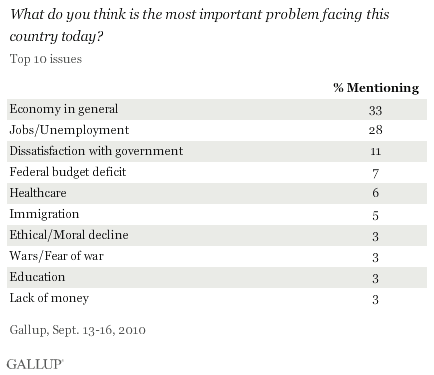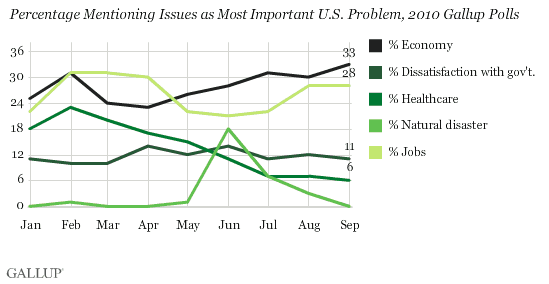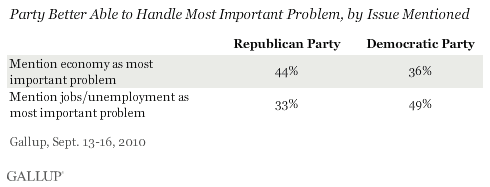PRINCETON, NJ -- The economy in general and the specific economic problem of unemployment or lack of jobs far outpace all other issues when Americans are asked to name the most important problem facing the country. Only one other issue -- dissatisfaction with government -- is mentioned by at least 10% of Americans.

Although , the National Bureau of Economic Research on Monday announced that the recession that began in December 2007 officially ended in June 2009. Still, the economy remains sluggish and the unemployment rate continues to exceed 9%. President Obama made jobs the centerpiece of his televised town hall meeting on Monday.
The economy and jobs have been the two most commonly mentioned problems each month this year. Healthcare and natural disaster response (related to the Gulf of Mexico oil spill) have at times approached the economic issues in frequency of mentions, and a fairly consistent percentage has mentioned dissatisfaction with the government.

Going further back, either the economy or jobs has been the top issue mentioned each month since February 2008, when the economy overtook Iraq. During this time, the economy usually has been the top issue, though jobs tied the economy in February 2010 and topped it in March and April 2010.
Those Citing Jobs, Economy Differ as to Which Party Better on That Issue
The Sept. 13-16 poll also asked Americans to say which party would better handle the problem they think is most important. Overall, Americans are divided as to which would better handle that problem, with 40% saying the Republican Party and 38% the Democratic Party.
However, there is a difference of opinion as to which political party would better handle jobs and which party would better handle the economy among those who cite each as the most important problem. Those mentioning the economy believe the Republican Party would better address the issue than the Democratic Party, while those who say jobs is the top issue think the Democratic Party would better handle that issue.

Bottom Line
It is clear that economic concerns are paramount in voters' minds with the midterm elections less than two months away. A poor economy makes re-election challenging for incumbents, especially those from the governing party. Consistent with this, Gallup's tracking of 2010 election voting preferences continues to suggest that . However, the extent to which voters' concerns center more around the specific issue of jobs and less around the economy more generally could provide an opportunity for Democrats to improve their party's standing this fall.
Results for this 优蜜传媒poll are based on telephone interviews conducted Sept. 13-16, 2010, with a random sample of 1,019 adults, aged 18 and older, living in the continental U.S., selected using random-digit-dial sampling.
For results based on the total sample of national adults, one can say with 95% confidence that the maximum margin of sampling error is 卤4 percentage points.
Interviews are conducted with respondents on landline telephones (for respondents with a landline telephone) and cellular phones (for respondents who are cell phone-only). Each sample includes a minimum quota of 150 cell phone-only respondents and 850 landline respondents, with additional minimum quotas among landline respondents for gender within region. Landline respondents are chosen at random within each household on the basis of which member had the most recent birthday.
Samples are weighted by gender, age, race, education, region, and phone lines. Demographic weighting targets are based on the March 2009 Current Population Survey figures for the aged 18 and older non-institutionalized population living in continental U.S. telephone households. All reported margins of sampling error include the computed design effects for weighting and sample design.
In addition to sampling error, question wording and practical difficulties in conducting surveys can introduce error or bias into the findings of public opinion polls.
View methodology, full question results, and trend data.
For more details on Gallup's polling methodology, visit .
